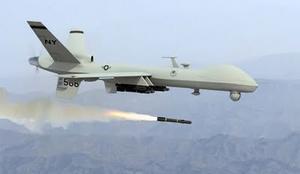DronesNew Obama policy sets higher standards for drone use
In a major policy speech Thursday, President Obama announced plans to set higher standards for the use of drones in the fight against terrorists. He defended the use of the unmanned vehicles in that war, however, including when, in extreme situations, they are used to kill American citizens.

Elevated standards set for drone strikes // Source: alqabas.com.kw
In a major policy speech Thursday, President Obama announced plans to set higher standards for the use of drones in the fight against terrorists. He defended the use of the unmanned vehicles in that war, however, including when, in extreme situations, they are used to kill American citizens. The Washington Post reports that the administration acknowledged that CIA drone strikes killed four American citizens in Yemen. One of them, the jihadi preacher Anwar al-Awlaki, was targeted, the other three — Samir Khan, who was killed in the same strike that killed al-Awlaki; and Awlaki’s son, Abdulrahan al-Awlaki, and Jude Kenan Mohammad ,who were killed in separate strikes — were not.
“Of course, the targeting of any Americans raises constitutional issues that are not present in other strikes — which is why my administration submitted information about Awlaki to the Department of Justice months before Awlaki was killed and briefed the Congress before this strike as well,” he said. “But the high threshold that we have set for taking lethal action applies to all potential terrorist targets, regardless of whether or not they are American citizens.”
Obama signed a new classified policy guidance which places significantly restrictions on when drones may be used outside of war zones. The restrictions will slow the already diminishing use of drones in countries like Yemen, and Somalia.
Administration officials indicated that the new restrictions will not materially affect their use in Pakistan..
The president also indicated that the Pentagon will assume a greater role in conducting the drone war, while the role of the CIA in operatin attack drones will be reduced.
The policy says that lethal force will be used only for targets that pose “a continuing, imminent threat to Americans,” and which cannot feasibly be captured. Attorney General Eric Holder, in a letter to Congress, suggested that threats to countries such as Yemen would no longer be enough to justify an attack.
The policy could also end “signature strikes,” or attacks against an unknown group of men, based on the assumption that they are members of al Qaeda or another terrorist organization. Critics of the Obama administration critics said that signature strikes have led to many civilian casualties.
CIA director John Brennan said that drone strikes have been decreasing in recent years as targets have been eliminated and local opposition to terrorism has grown.
Brennan wants the agency he leads to return to focusing on forward espionage, intelligence gathering, and analysis.
Senator Jack Reed (D-Rhode Island) who sits on the Armed Services Committee, said that it was time to “rebalance” the missions of the Pentagon and C.I.A.“The policy is intended to refocus the activities of the intelligence community to collection, which is crucial,” Reed told the Post.
In his letter to Congress, Holder said that drone strikes were consistent with American law and were conducted after careful consideration. “Based on generations-old legal principles and Supreme Court decisions handed down during World War II, as well as during the current conflict, it is clear and logical that United States citizenship alone does not make such individuals immune from being targeted,” Holder wrote.
Obama’s discussion of drone use was embedded in his review his record in the war on terrorism and counterterrorism policy, and how changes are required in the U.S. security policy in response to a different security challenge the country is facing now relative to what it faced twelve years ago.
Obama said that while the threat of a large-scale attack within the United States has diminished, small organizations affiliated with al Qaeda are flourishing in some of the lawless parts of the Arab world, including in countries undergoing political transitions.
To weaken these groups, the United States needs to adopt different policies, including a reliance more on drones and intelligence rather than a large U.S. military presence.
